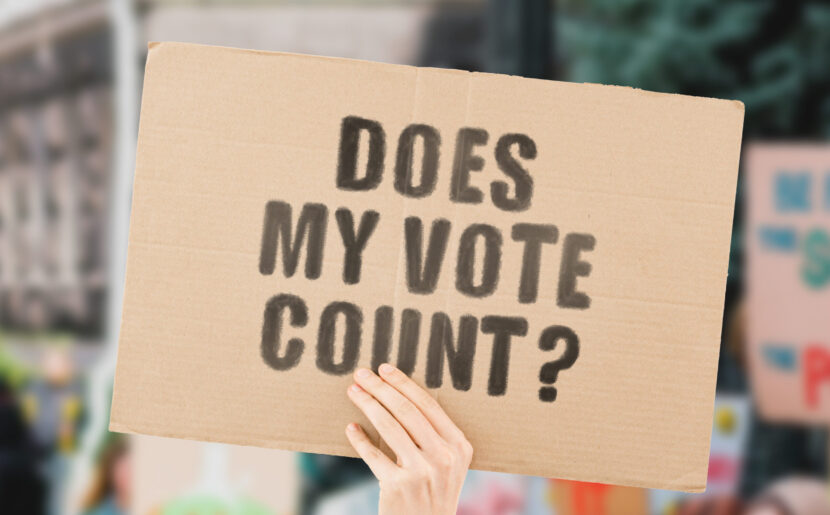So You Think Your Vote Doesn’t Count . . .

Nov. 8 midterm elections are upon us. Who cares? Our elected officials don’t listen to us, they have their own agendas. Pollsters and the media tell us what we’re thinking, so why bother to vote? The issues are complex, talking points are without nuance, and big money controls things. Besides, I don’t have time in my busy life to sort it out.
We’re told our country is divided on multiple issues. Is it really? A common way to illustrate division is to analyze votes by the percentage of voters who favor one side or the other. The fallacy here is that the past five presidential elections, on average, saw fewer than two-thirds (62%) of eligible U.S. voters cast ballots.
According to Ballotpedia.org, the five year average turnout in midterm elections is a dismal 42%. How can pundits say with confidence that the country is divided when anywhere from 38% to 58% of eligible voters are silent?
Yes, the issues are complex. There are many of them: gun violence, immigration, food programs for children, the death penalty, climate change, the recent Supreme Court Dobbs decision, to name only a few. No matter your view, you have the power and responsibility to register your opinion with your ballot. Your vote is your civic voice.
We voters do have power. Why else would so many states be considering legislation to make it harder to vote? If our elected officials cannot free themselves from big money or lockstep party allegiance, or comprehend the nuances of an issue, we citizens must elect new ones who can and will.
Here’s a strategy: identify three issues that matter most to you. Do your citizen homework and decide where you stand on each issue. If you can, attend town hall meetings and question the candidates about funding sources that influence their votes on your issues. Print and electronic media can help you track candidate positions and votes by already elected officials.
Your chosen candidate may not stand much of a chance. It’s unlikely that any one candidate will agree with you on every one of your issues, so you may have to compromise. Still, your vote is your voice. Win or lose, your opinion makes a difference, if not to elected officials, then to those who analyze voting patterns. Never discount the value of peer pressure! Today’s vote may change tomorrow’s direction.
Voting is not a partisan issue; it is citizen power at its best. Now that you’ve decided to vote, kick it up a notch and find a way to motivate others to vote. Ways to assist can be found on websites of groups like The League of Women Voters, Southern Poverty Law Center, Common Cause, American Civil Liberties Union, or the NAACP.
Nov. 8 midterm elections are upon us. Let’s beat the average 42% turnout in 2022. Let’s let those we elect, the pundits and our companion citizens know whether we’re really a divided country and on what issues. At the very least, we can rest assured we’ve done our part.
Voter turnout in United States elections. Ballotpedia. (n.d.). Retrieved September 5, 2022, from https://ballotpedia.org/Voter_turnout_in_ United_States_elections
This story was featured in:
FALL 2022: Together we participate in God’s creating action, transforming the earth. (BVM Constitution #11)
In this issue of Salt, we celebrate the legacy of our beloved Lou Anglin, BVM; the 103rd birthday of Jean Dolores Schmidt, BVM; fifteen 70-year-Jubilarians, and our first in-person Assembly since COVID-19. We look to the future as we continue to adapt our mission, sponsor women in pursuit of education, support children in need, and advocate for justice in society and in the Catholic Church.
If you would like to receive Salt, contact the Office of Development for a complimentary subscription at development@bvmsisters.org or 563-585-2864.
